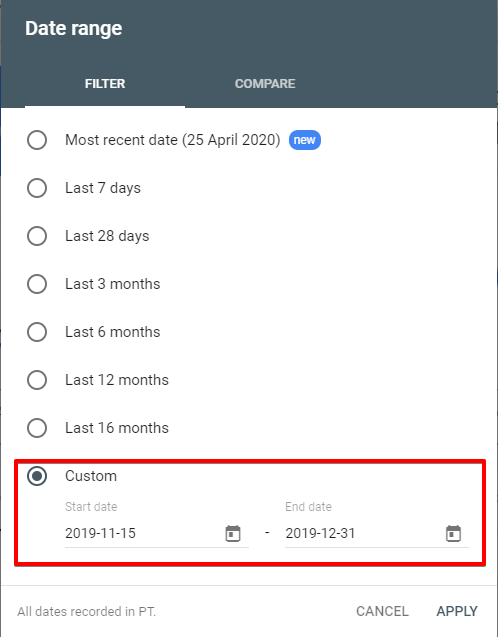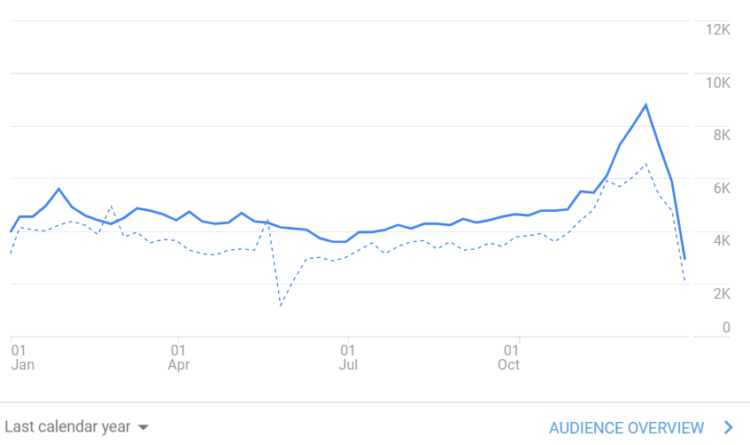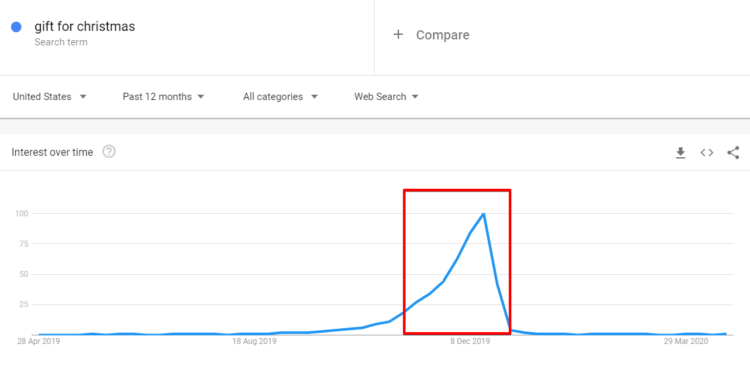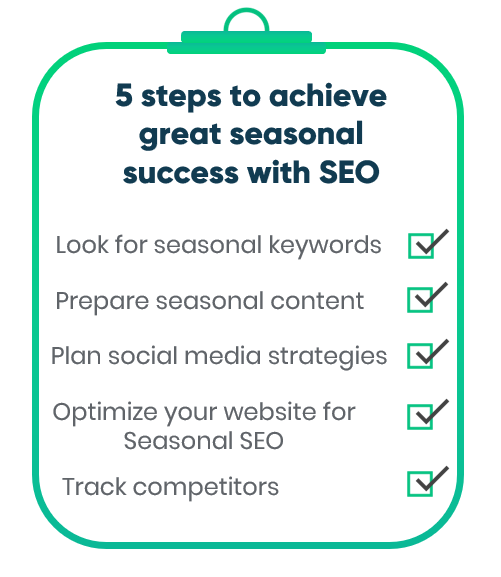5 Tips for Achieving Great Success with Seasonal Industry SEO

Did you take seasonality into account in your current SEO strategy? If not, it can turn out to be a huge problem for you and your business. Believe me – with a well-planned SEO campaign targeted at seasonality you can really gain a lot. In this article, I will tell you what seasonal SEO is and how to properly prepare marketing strategies thanks to which your business will achieve great seasonal success.
What is Seasonal SEO? Definition
As you can probably observe when running a business, at certain periods of the year more people visit your website and buy more products, while at other times the traffic on your website drops. Many people starting cooperation with an SEO agency make an assumption that from that moment the traffic on their website will constantly increase. But actually that’s just the wrong way of thinking. Why? Look at this example:
Let’s imagine you’re running an online store that offers electric heaters. Do you think people will be interested in buying your heaters all year round? Probably in winter, when it’s snowing outside and people don’t want to get cold at home, there’s a higher chance that they will search in Google for the best solution to heat a house. The traffic to your website will probably increase, and this will be a perfect period for you to raise revenues. As you can easily guess, the traffic will probably drop in the summer.
So, as you can see, some keywords will be searched all year round, while others only seasonally. When planning SEO strategies, you should take into account not only the phrases that will increase traffic throughout the year but also those searched by users at certain periods.
In general, there are two different types of seasonal SEO strategies:
- time-oriented: Spring, March, etc.
- event-oriented: Christmas, Valentine’s Day, Black Friday, Mother’s Day, etc.
Is Seasonal SEO Really That Important for Your Business?
Believe me, seasonal SEO is extremely important for your business and with seasonal marketing strategies you can achieve great success.
So you need to prepare properly for the season in which your business can potentially be successful. If you notice that in your industry there are dead seasons and periods when interest and traffic increases, there is no need to wait. Choose the best seasonal SEO strategies. How do you do that? I’ve prepared some tips for you.
Tip 1: Look for Seasonal Keywords
In planning a seasonal SEO strategy, the right choice of keywords is the first step you need to take. Thanks to this, the content on your website will meet the users’ needs. How to choose the right keywords?
Google Search Console
Google Search Console is one of the basic tools that help you monitor your site traffic and, what’s especially important, check the keywords that appear in Google search results. Go to your account in the Search Query section. There you will find all the keywords that increase traffic to your site. All you have to do is choose the right period and then you will certainly notice seasonal keyword opportunities. For example, if your website generates the most traffic around Christmas, set the date filter, let’s say, from November 15 to December 31.
As you can see from this graph, the traffic on this page during the year increases mainly around Christmas. Based on this, you can see which keywords were most popular during the Christmas period and prepare adequate SEO strategies before December.
Select this option (Custom) to check the keywords in the period you are most interested in.
Google Analytics
Another tool offered by Google will allow you to check exactly (as long as you have had a Google Analytics account for a long time, minimum one year) in which periods of the year your website generates the most traffic. Thanks to Google Analytics, you will determine which months are crucial for you and prepare SEO campaigns in advance. The key is to analyze the website and look for patterns.
Google Trends
This is a bit less popular tool offered by Google, yet it is really useful when looking for seasonal keywords. Don’t you know what interests users in a given period of the year? Google Trends will certainly give you some clues!
Try this tool – just type in the keyword that you want to check (I chose gift for Christmas), select the country or region and period.
As you can see, most people look for a Christmas gift from the 15th to the 21st of December. However, what’s important, based on this chart, you can observe that a SEO campaign promoting Christmas gifts should be launched as early as the end of October – then users start looking for the perfect gift for friends or family.
Tip 2: Prepare Seasonal Content
Seasonal content is a great solution for attracting natural backlinks to your website. If it responds to users’ needs and is above all informative, interesting, and substantive, the users will link it. This strategy is called link baiting (read the article on our blog if you want to learn more about it: What is link baiting?). Remember about timing – publish your content at the right time, when users search for it.
Properly prepared content can lead to increased sales. However, it should meet the following criteria:
- optimize it properly using the seasonal keywords (if you want to learn how to optimize your website, check out Tip 4)
- the content should respond to the seasonal needs. When preparing the seasonal content, check the competitors’ blogs, survey your clients, or ask your customer service team – they certainly know what questions customers ask most during this period.
- recommend the products and services offered by your brand. Mention in the content any potential problems that can be solved with your products.
What content should you prepare?
- blog articles – prepare a list of topics for your blog that will respond to users’ needs and will be searched by them in search engines, resulting in increased traffic to the site;
- content assets – prepare additional content, e.g. infographics, videos or ebook;
- collaborative content – start collaborating with influencers, e.g. conduct an expert interview with them or ask to promote your brand in social media.
Tip 3: Plan Social Media Strategies
A well-planned campaign in the most popular and influential social media can do wonders, especially during the best season for you. So focus on campaigns above all in social media, which are crucial for your business.
What the seasonal campaign in social media should include?
- keywords and hashtags – focus on the most important keywords for your business and on those promoting your priority products or services;
- effective cooperation of teams – SEO, SEM, content marketing and social media team should collaborate effectively with customer service and sales team. It’s extremely important because it will help your marketing team to discover which products are being promoted and what questions customers ask. This will allow you to better adjust your seasonal campaign to the customers’ expectations.
- social media editorial tools – you will easily find many tools that will help you organize your social media campaigns. One of the recommended tools is ContentCal. Try it out and you’ll get the benefits quickly!
Tip 4: Optimize Your Website for Seasonal SEO
Many website owners decide to create a brand new page, especially for seasonal SEO. This is one of the basic errors that can be made! Here’s why:
- It takes a lot of time to build up a page authority and get many backlinks, pages with a low authority rate will not rank high on Google.
- If you create many similar pages, there is a risk that the level of internal duplication will increase. Remember – Google really doesn’t like duplication, it prefers unique content.
It is important to leave already existing pages. All you have to do is optimize them for seasonal SEO.
Let’s get to the point! I’ll explain to you what step you need to take to succeed with seasonal SEO:
- Find seasonal keywords – in Tip 1 I’ve explained how to look for the seasonal keywords. Once you find the keywords that have the greatest potential for success, you can get to the next point.
- Choose evergreen URLs – It is very important that the URL does not indicate the year (for example: “best-idea-for-christmas-gift-2018”), because then both users and the search engine will notice that your page contains outdated content. After all, you want to achieve seasonal success each year, right?
- Internal links – Add some internal links to your content. However, it is important that these links redirect to content related pages, for example to product pages (especially to the most important products for your business)
- Title tag – As you probably already know, the title tag is one of the most important elements on the page. Include a seasonal keyword in the title tag which corresponds to the content of the subpage.
- Web indexing – Optimizing the website for seasonal SEO, timing is crucial. That’s why don’t wait so long for Google to crawl your seasonal content. After optimizing the page, go to the Google Search Console and request indexing. This will make Google visit the site faster and you’ll rank higher in the search results.
Tip 5: Track Competitors
Monitoring your competitors is a good way to achieve success in SEO not only during the season but throughout the year. That’s why at the beginning of the cooperation with our agency we ask our clients to indicate their main competitors. Thanks to this, we have the greater opportunity to see, first of all, on which keywords they appear in search engines and what is the estimated traffic on their websites.
If you plan to launch a seasonal SEO campaign without monitoring your competitors and their activities, you will have less chance of success.
1. Set up the alerts
Your priority is naturally that the website appears on the first page (in TOP 10) in search engine results for a given keyword. Unfortunately, even if you achieve this success, by the activities of our competitors the position of a given keyword may change. There are tools that will notify you every time one of your competitors posts content or optimize it using the keyword of interest. This allows you to react quickly.
2. Subscribe to competitors’ newsletters
Many brands start their marketing campaigns by sending emails to their clients and subscribers. Subscribe to their newsletter and will be able to see what content the competitors have prepared and what products they offer for the season. Brands always send out newsletters before the start of the season, so you can react quickly and optimize your website or prepare your content on time.
Summary
As you can see, your business can succeed with seasonal SEO. Remember, however, to monitor your web traffic throughout the whole year and based on this, choose the best seasons for your business. What is more, it is good to prepare SEO strategies for the most important seasonal events, such as Valentine’s Day, Mother’s Day, Black Friday, Cyber Monday or Christmas. If you need help with running a successful seasonal SEO campaign, contact us, we will be happy to help you and answer all your questions!







